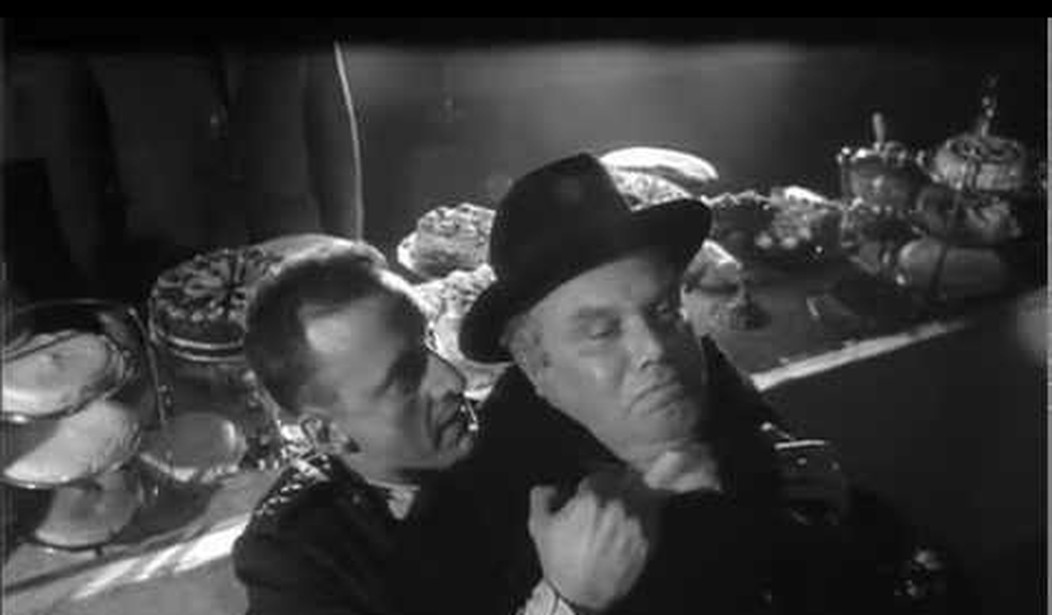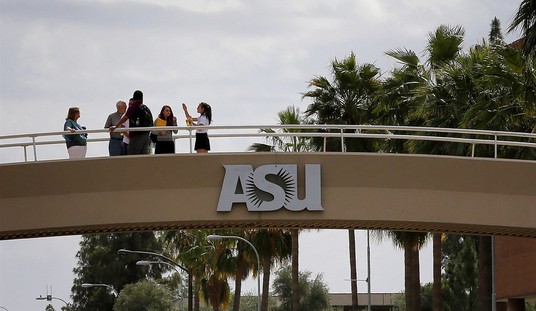Now that the Left, 150 million dead people later, has finally decided that Russia is a threat to democracy, and Democrat leaders are finally talking about the KGB 25 years after it was disbanded (note to Juan Williams, it’s called the FSB now, and it’s not quite the same thing), we thought it was time to look at some highlights of how Russian and American relations have played out throughout the decades in Hollywood.
From early mockery of Marxism to the dramatic symbol of communism provided by the Berlin Wall, overt Soviet communism did not fare well in major Hollywood productions (despite a concerted effort to introduce themes by the Comintern). However, the threat of nuclear annihilation scared liberal Hollywood into a posture that began to push a moral equivalence that warriors on both sides were to be mistrusted.
After the fall of the Soviet Union, it was the Russian mob that became the ubiquitous boogeyman in film and television.
Now, of course, the KGB is being blamed for Democrat losses, and they are the big bad guys on the world stage. It will be interesting to see if Hollywood liberals follow suit in a way they rarely did with Islamist terror.
Note: The list is arranged in historical order, not in production order, and great Cold War British movies will have to wait for another list.
First up, two pre-war (and pre-Hitler/Stalin Pact) romantic comedies satirized Soviet communism with big stars and big laughs:
1. Ninotchka (1939)
Ninotchka is the more accomplished of the two, with one of Greta Garbo’s most famous performances as a stern Soviet apparatchik. She’s been sent to rein in three Russians sent to Paris to sell off the Czar’s jewelry who have been seduced by capitalism and freedom. Ninotchka is then herself seduced by freedom—and Melvyn Douglas. During the war, a revival of the film in America was suppressed because, by then, the Soviets were our “allies.”
Directed by the great Ernst Lubitsch, who also mined big laughs from Nazis in To Be or Not to Be, and led by a screenwriting team that included Billy Wilder (also to appear later) the movie is filled with great lines such as when Garbo deadpans, “The last mass trials were a great success. There are going to be fewer but better Russians.”
2. Comrade X (1940)
In Comrade X, Clark Gable is the romantic foil, who seduces Hedy Lamar. Gable plays a newspaperman filing unflattering stories from Moscow under a pen name. His valet discovers his identity and blackmails him into marrying his daughter to get her out to freedom—despite her being a committed communist. It’s more slapstick than Ninotchka, and the closing line is a classic.
3. The Big Lift (1950)
Slightly soapy, but filled with great on-scene location shooting in war-torn post-war Berlin, this is a very good movie about the Berlin Airlift that really deserves to air on TNT far more often than it does.
What really sets The Big Lift apart is the rare chance to see a movie about a historical crisis that was shot immediately after the event.
Giving the movie an added realistic boost, all the U.S. military roles, except by star Montgomery Clift and veteran character actor Paul Douglas, were filled by actual military personnel. Newsreel footage of the airlift was skillfully edited into the narrative and additional flying scenes were also filmed on location, often in bad weather.
4. One, Two, Three (1961)
This criminally overlooked comedic gem is the only pairing of greats James Cagney and director Billy Wilder.
Cagney plays Mac, a Coca-Cola executive sent to Berlin to promote the soft drink to the newly freed market of former enemies. Berlin is a divided city, but this is before the Berlin Wall went up, so travel between the Soviet zone and the rest of the city is controlled but permitted.
Mac’s professional life is threatened when his boss’s daughter secretly marries a handsome young communist and plans to move to Moscow with him to a “magnificent apartment, just a short walk from the bathroom.” Wilder, who also was a writer on the classic Ninotchka, takes a lot of similar jabs at communism, while also including some funny commentary on big business.
Mac decides his only option is to seduce the young man with the benefits of capitalism.
One, Two, Three sets a frantic pace that makes even the classic Howard Hawks screwball comedies His Girl Friday and Bringing Up Baby seem slow. However, by the time the film was released in 1961, the Berlin Wall had just gone up, and with news reports showing ordinary people being shot and hanging in barbed wire, the public wasn’t ready to laugh at this setting.
The film was banned in Finland until 1986 for fear of offending the Soviets and was re-released in 1985 in West Berlin to great public enthusiasm. From a safe perch in America, this is great fun with one of our classic leading men.
5. Bridge of Spies (2015)
https://youtu.be/g91rOk8KHVI
Steven Spielberg’s recent Oscar-nominated film is the story of an American lawyer, James Donovan (Tom Hanks), pressed into service to be the attorney for the notorious captured spy Rudolf Abel, eventually becoming involved with the swap on an East/West German bridge for U2 pilot Francis Gary Powers.
Some early Spielberg-esque stabs at moral equivalence (made up sequences of violence directed at the Donovan home) are easily overcome by the dystopian nightmare Donovan encounters while negotiating with the Soviets on the wrong side of the Berlin Wall—especially parallel scenes of Donavan on an elevated train in NYC watching kids hopping fences, and a flashback to families being machine gunned while trying to climb over the Wall.
One of the best films concerning American/Soviet negotiations with lives in the balance.
6. Dr. Strangelove: Or How I Learned to Stop Worrying and Love the Bomb (1964)
Of all of the liberal nuclear-war-will-kill-us-all-and possibly-by-accident movies of the 50s and 60s, (Fail Safe, On the Beach, The Bedford Incident), Stanley Kubrick’s wild satirical masterpiece with Peter Sellers in three roles is by far the best—and it’s hilarious.
Like The Godfather and Casablanca, the movie added phrases to the American pop lexicon, and the circular war room table has been oft-imitated in more “serious” films. And who can ever forget Slim Pickens’s ride on a nuclear bomb after he frees it from a faulty bomb release in his B-52?
7. The Manchurian Candidate (1962)
The. Best. American. Political. Thriller. Ever.
Based on Richard Condon’s dark Cold War satirical novel, The Manchurian Candidate concerns a Soviet/North Korean plot to place a brainwashed former POW into a 1960s anti-Communist organization (modeled after the John Birch Society) run by his Soviet sleeper agent mother.
Besides the obvious statement it makes that the excesses of the anti-communist movement hurt its cause more than the KGB ever could, this also has a basis in espionage history. In the 1920s and 1930s, Stalin covertly funded anti-communist groups of expat Russians so they would all gather in one place where he could keep an eye on them.
Brilliantly acted by Frank Sinatra, Laurence Harvey, Joseph Cotten and the late, great Angela Lansbury, The Manchurian Candidate is one of the 20 greatest American films of all time.
The misguided Denzel Washington-led remake was one of the all-time missed opportunities, made as it was in the middle of the Global War on Terror because PC Hollywood ignored real life. However, that opportunity was seized by Homeland Season 1, as one of the best first seasons any premium cable show has had, outside of the Sopranos and The Wire.









Join the conversation as a VIP Member